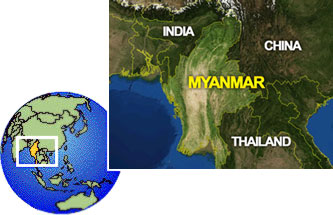Cyclone kills over 22,000 people in Myanmar (FCN, 05-08-2008)

UNITED NATIONS (Finalcall.com) – UN Secretary-General Ban Ki-Moon has called for a special summit to discuss measures that could be taken to deal with the humanitarian crisis in Myanmar.
Cyclone Nargis ravaged southern towns of the Irrawaddy Delta May 3 and the United Nations estimates the death toll could reach 100,000, with at least 2.5 million people possibly affected by the cyclone’s aftermath.

“I want to register my deep concern and immense frustration–at the unacceptably slow response to the grave humanitarian crisis in Myanmar,” said United Nations Secretary-General Ban in mid-April. Mr. Ban said he had tried repeatedly to telephone Myanmar’s senior general, Than Shwe. He was unsuccessful and had a letter delivered through diplomatic channels.
Mr. Ban told reporters the world body had been able to reach less than one-third of the people at risk in Myanmar, about 270,000 people. The UN’s World Food Program estimates the amount of food allowed into Myanmar at Final Call presstime was less than one-tenth of what is needed, as rice stocks in Myanmar were close to exhaustion.
Elizabeth Byrs, head of the UN Office for Humanitarian Affairs, called for an air and ground channel where large quantities of aid could be moved as quickly as possible. Analysts warn airlifts could be seen as a violation of Myanmar’s sovereignty. France has argued in the UN Security Council for a “responsibility to protect” resolution, which would allow international aid delivery without the military junta’s permission.
Responsibility to protect became part of the UN landscape in 2005, when 150 leaders attending the UN World Summit adopted a resolution mandating that the world body intercede when people need to be protected from genocide, ethnic cleansing and crimes against humanity.
In the U.S., experts at the Brookings Institute said the UK and the U.S. must support the French in the Security Council.
“If the international community fumbles this, it will not only confirm the hollowness of its commitment to its principles, but accelerate the UN’s lack of relevance,” said one analyst.
“If the intransigence of the Burmese generals continues, it becomes a very real issue and some international action should be taken,” argued Garth Evans of the International Crisis Group.
Activists like Jeremy Woodrum of the Washington-based U.S. Campaign for Burma, part of the Institute for Asian Democracy, say Western governments are unwilling to back up rhetorical condemnation of the military’s response in Myanmar, also known as Burma, with action.
“The generals of Myanmar are afraid aid workers will discover their scorched earth initiatives. They have destroyed over 3,000 villages in their program of ethnic cleansing, which is being done to clear the land for the exploitation of the country’s vast oil and natural gas reserves,” Mr. Woodrum said. The generals are suspicious of Western government intentions, he added.
Energy analysts estimate Myanmar may have the largest natural gas deposits in Southeast Asia. The deposits are the nation’s main source of foreign exchange. The Burma Rights Movement for Action said oil exploration has accounted for 65 percent of foreign investment in Myanmar since 1988.
Human Rights Watch, in the past, has charged the Myanmar army with using violence and coercion to secure land for major investment projects and using forced labor to build infrastructure for the oil and gas industries. Human rights groups call Myanmar “Asia’s new killing fields.”
Nine foreign oil companies are exploring for oil on land, while six companies are exploring for the black gold off shore. Despite U.S. economic sanctions against the regime in Myanmar, Chevron has a 28 percent stake in the oil business. Activists said France’s TOTAL oil company plays a major factor in propping up the regime and perpetuating its brutal and illegitimate rule.
Over the last 15 years foreign direct investment has flowed into Myanmar largely for tourist infrastructure and natural resource extraction projects, but according to Mr. Woodrum, the military also expanded from 180,000 troops to 400,000 troops.
There is also the issue of countries involved in Myanmar’s oil and natural gas industry giving weapons to the generals, Mr. Woodrum said.
China has sent $2 billion worth of weapons to Myanmar since 1989. India sold artillery and has offered helicopters and training for Special Forces, according to Human Rights Watch. Russia has also supplied helicopters and military hardware and Human Rights Watch has called for companies to disclose all payments made to the Myanmar military.
Energy experts predict the new gas deposits, when developed, could yield between $37-$57 billion, an estimated $12-$17 billion could go to the government each year for the next 20 years.
In 2006, government revenue in Myanmar was $2.18 billion, which, according to analysts, was spent mostly to maintain the army. Myanmar has the lowest social spending rate of any nation in the world, activists said.












